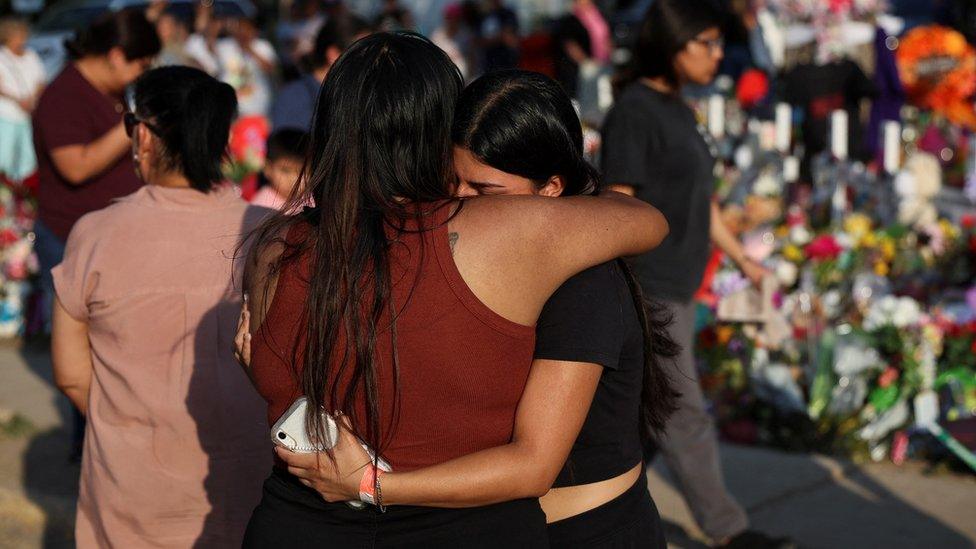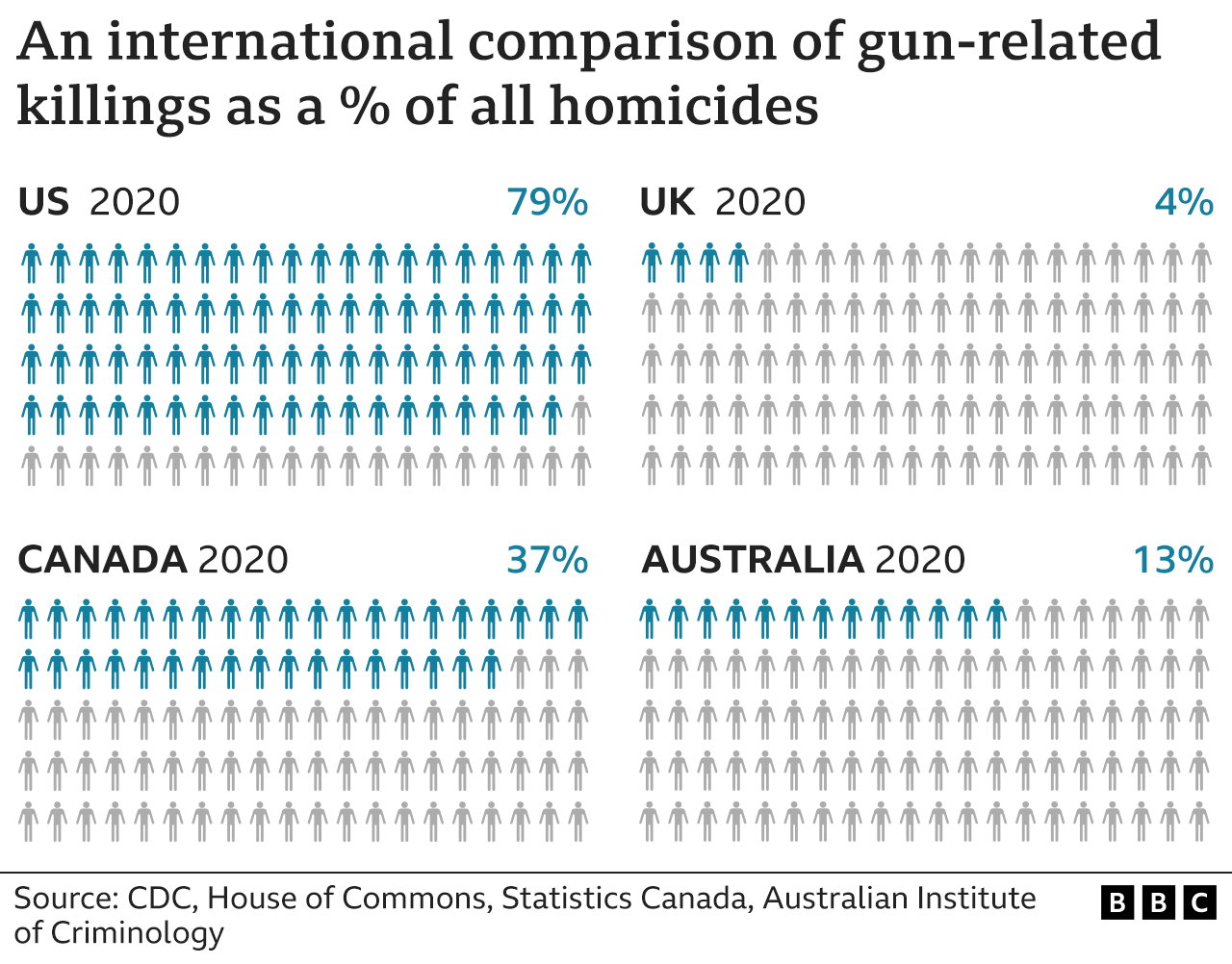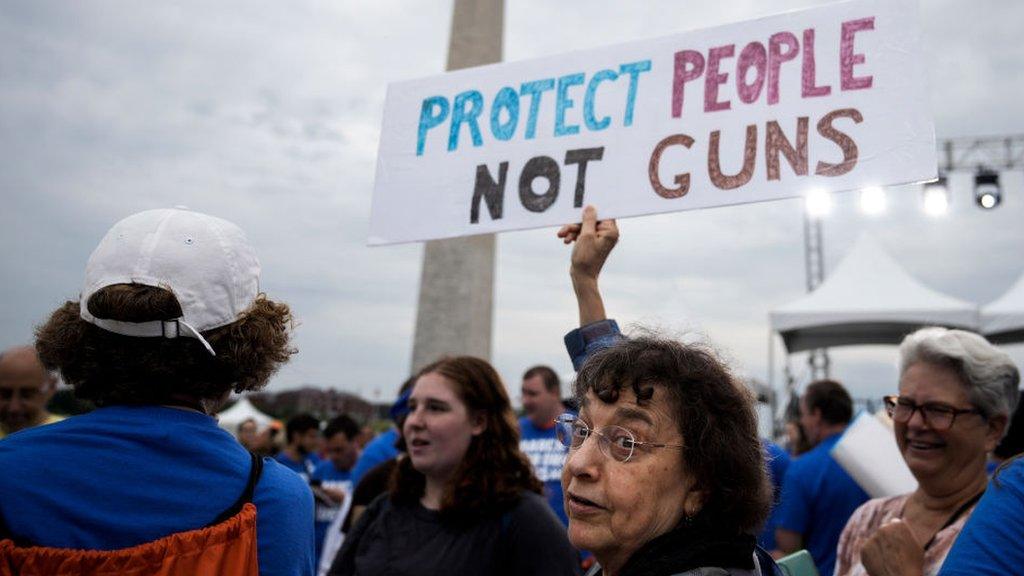US gun control: Cross-party group of senators agree limited safety measures
- Published

Women embrace at a memorial to those killed in the Uvalde mass shooting
A cross-party group of US senators have agreed a framework for potential legislation on gun safety, following a spate of mass shootings.
This would include support for tougher checks for buyers aged under 21 and cracking down on illegal gun purchases.
Crucially, the proposals are supported by 10 Republicans, meaning they have the numbers to be voted into law.
President Biden said the plans were "steps in the right direction" but they fall far short of what he called for.
Previous attempts to tighten gun laws failed to get the required support in Congress.
Tens of thousands of protesters rallied across the US on Saturday to call for stricter gun laws in the wake of two mass shootings.
"Today, we are announcing a common sense, bipartisan proposal to protect America's children, keep our schools safe, and reduce the threat of violence across our country," the Senate group said in a statement.
"Families are scared, and it is our duty to come together and get something done that will help restore their sense of safety and security in their communities."
The senators also called for increased investment in mental health services and school safety resources, as well as including domestic violence convictions and restraining orders in the national background check database for people buying firearms.
President Biden urged lawmakers to pass the proposals quickly, while making clear that they did not go as far as he wanted.
The president has pushed for far bigger reforms - including a ban on assault rifles, which were used in the Texas and Buffalo mass shootings - or at least an increase in the age at which they can be purchased.
"Obviously, it does not do everything that I think is needed, but it reflects important steps in the right direction, and would be the most significant gun safety legislation to pass Congress in decades," he said in a statement.
Senate Majority Leader Chuck Schumer, a Democrat who said the plans were "a good first step", said he wanted to move a bill quickly to a Senate vote once legislative details were worked out.
Senate Minority Leader Mitch McConnell, a Republican, said the measures showed "the value of dialogue and cooperation".
He added: "I continue to hope their discussions yield a bipartisan product that makes significant headway on key issues like mental health and school safety, respects the Second Amendment, earns broad support in the Senate, and makes a difference for our country."
Democratic Senator Chris Murphy said a "substantial" part of the deal had been nailed down by negotiators, allowing the drafting of legislation to get under way on Monday, Reuters news agency reported.
The news has also been welcomed by some gun control activists.
"This is a first step and it's actually a lot more than I thought it would be. This is progress even if small," tweeted David Hogg, a survivor of the 2018 Parkland school shooting and co-founder of March for Our Lives, a student-led movement focused on gun violence prevention.
"Even if it stops one Parkland it's worth it."
"Our grassroots army is ready to fight like hell to make sure it becomes law. 26 years for federal action on gun safety is unacceptable," tweeted Moms Demand Action, a gun control advocacy organisation.
The National Rifle Association of America (NRA) said it would respond once the full text is released but said it would "continue to oppose any effort to insert gun control policies, initiatives that override constitutional due process protections & efforts to deprive law-abiding citizens of their fundamental right to protect themselves/loved ones into this or any other legislation".
Watch: Thousands join gun control rallies across the US
The US has the highest rate of firearms deaths among the world's wealthy nations, but is a country where many cherish gun rights that are protected by the Constitution's Second Amendment to "keep and bear arms".
These are the first gun safety laws to receive bipartisan support of this kind in decades, with previous attempts by Democrats for strengthened controls frustrated by Republicans.
Attempts to tighten the laws in the wake of a previous school shooting at Sandy Hook in Connecticut nearly a decade ago - in which 20 children and six adults were killed - failed to get the required votes in Congress.
The Senate, or upper chamber of Congress, is currently split - with 50 Democrats and 50 Republicans - and legislation must have 60 votes to overcome a manoeuvre known as the filibuster.
Ten of the 20 senators who proposed the new measures are Republicans, meaning the proposals have the numbers needed to overcome the filibuster.
The Democrat-controlled lower chamber, the House of Representatives, this week voted through a series of measures regulating the sale of guns.
But Republican opposition in the Senate means the bill has little chance of entering law, leaving the bipartisan deal agreed on Sunday as the only realistic hope for federal measures to address firearms violence.

Related topics
- Published11 June 2022
